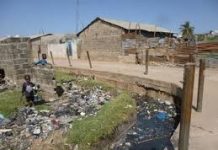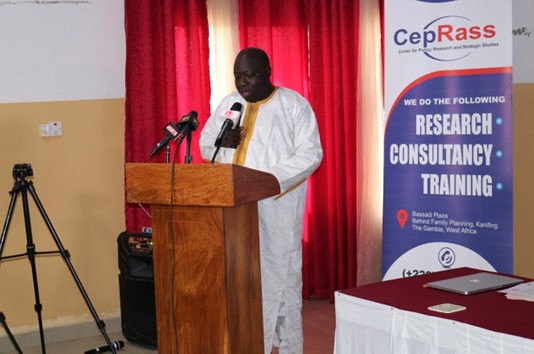CepRass Director
By: Kebba AF Touray
Lamin Dampha, Executive Director for the Center for Policy Research and Strategic Studies (CepRass), said parliament must be guided by a good understanding of public opinion on issues of national interest, if it is to be based on pertinent governance issues.
Dampha said this on Wednesday, during the opinion poll dissemination on their findings, to media practitioners.
“For the National Assembly to be based on pertinent issues on the governance of the country, it must be guided by a good understanding of public opinion on issues of national interest,” he asserted.
Inaugurated in 2016, Dampha said the center aims to complement the efforts of UTG in delivering quality research and consultancy services; that CepRass is independently owned, managed and run by a constituted group of members who maintain close collaboration with the UTG.
CepRass he said uses cutting edged research methods that combines both qualitative and quantitative approaches, to address critical socioeconomic issues, migration, development and political governance related issues, and also to strengthen competitiveness in obtaining research funding in the designated areas. He said the center operates as a non-profit organization, with a strong conviction that research is an important pillar for informed policy and decision making.
“The center focuses on research and consultancy services on thematic areas related to innovation and development, politics and governance, economic growth and inequality, migration, education and health, and organizational building and management systems for development,” he said. He said the center, through the opinion poll they conduct and their civil society capacity building project which is funded by NEDI, commissioned its debut series of political opinion poll research in the Gambia, to track public perception on issues of national interest.
“Opinion poll surveys are very popular in modern democracies. Until CepRass’ first and second public opinion polls published on 1st October and 26th November 2021, there has been no opinion poll conducted that is focused on informing the public on pertinent issues concerning an election”, he told the convergence. He expressed gratitude to their teams for a job well done, and the National Endowment for Democracy (NEDI), for providing the needed support to undertake the opinion poll survey.
Essa Njie, Political Science Lecturer at the UTG, dilated on the importance of opinion polls (OPs) in a democracy process, and said to predict an electoral outcome is not an easy process; that the essence of such prediction is not to a deliberate attempt to influence the way people vote, but it is an attempt to understand the opinions of people towards candidates and parties, stating that opinion polls are also meant to gauge the views of people on issues ahead of elections.
“This is called issue voting in political behavior. Opinion polls are also meant to know what the people think of a Government. Equally, they are meant for us to know how people feel about a particular issue in the governance of the country, which can further help Government to respond to issues and demands raised by the citizenry,” he said.
On the importance of opinion polls, he said it helps people to be heard, and is a form of encouraging popular participation and guidance of the actions of Government on a particular issue (s); that it influence public policy, provides feedback to Government on the decisions made; provides opportunity for rule by the people in a democracy; promotes democratic accountability and ensures a responsive, responsible and representative Government.
Muhammed S Bah, president of the Gambia Press Union, said the role of the media is to hold Government accountable to the people.
“Saturday’s National Assembly election will be a great test for our democracy. I therefore call on all eligible Gambian voters to vote wisely, to ensure that competent candidates are voted into the legislature”, he urged. He challenged media practitioners to give a thorough and deep analytical broadcast and report on pertinent national issues such as corruption and the performance of the fifth legislature, to enable the public understand the happenings in their country.






















